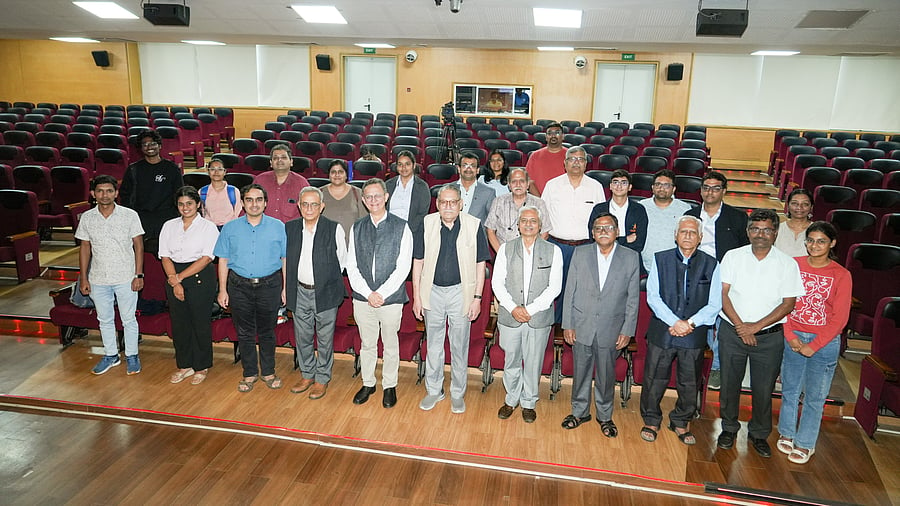
The formal proceedings were initiated with welcome remarks by Dr Sunil Bhagwat, an academic and long-time associate of NCSC, and A P Deshpande, former chairman of NCSC.
Credit: Special arrangement
Mumbai: Scale models of Indian Space Research Organisation's (ISRO) major launch vehicles such as SLV, PSLV, and GSLV, alongside payloads including Chandrayaan-3, symbolising India’s lunar triumph were on display as the 100th birthday of Prof. Eknath Vasant Chitnis, one of the principal architects of India’s space programme, was celebrated in Pune over the weekend.
Prof E V Chitnis, born on 25 July 1925, stays in Pune.
Prof Chitnis was a close associate of Dr Vikram Sarabhai, the visionary architect of India’s space programme.
Prof Chitnis played a crucial role in the early years of the Indian National Committee for Space Research (INCOSPAR), which later transformed into the ISRO.
From selecting Thumba as the site for India’s first rocket launch to leading projects in satellite-based mass communications, Prof Chitnis’ legacy spans scientific innovation, leadership, and institution-building.
The Prof E V Chitnis Centenary Conference on ‘Pioneering Space, Science, Policy & Innovation’ was hosted jointly by the Indian Institute of Science Education and Research (IISER), Pune and National Centre for Science Communicators (NCSC), Mumbai.
In one of the most emotionally resonant moments of the session, Dr Chetan Chitnis, renowned scientist and son of Prof Chitnis, offered a personal tribute that bridged the public and private lives of his father. “He is a devoted family man, a quiet but strong-willed figure, and a deeply compassionate mentor,” he said.
Dr A S Kiran Kumar, former Chairman of ISRO, reflected on Prof. Chitnis's contributions to remote sensing, communications, and mission planning, and noted that even decades later, his thought processes and frameworks continue to guide ISRO’s decision-making.
“Prof E V Chitnis stands as a titan in Indian space science and technology. A founding Member, Secretary of INCOSPAR, which paved the way for creation of ISRO, he played a key role in the conception and execution of India’s space program from its inception. He was instrumental in selecting Thumba as India’s first rocket launch site and contributed to the launching of India's first rockets, starting with the Nike Apache in 1963. Later, he pioneered the use of satellites for mass communication, leading the SITE project in the 1970s, the largest experiment at the time to use satellites to bring educational television to far flung villages across India. As Director of the Space Applications Centre, Ahmedabad, Prof Chitnis led several programs that demonstrated the powerful potential of satellite technology for telecommunications and remote sensing to provide practical solutions for national problems,” said according to Suhas B Naik-Satam, the Conference Convenor.
The exhibition was curated by Anish Gawande, a passionate amateur astronomer and space enthusiast, and supported by a dedicated team of young science communicators, the exhibition offered visitors - particularly students - a tactile and engaging experience of India’s space journey.
The formal proceedings were initiated with welcome remarks by Dr Sunil Bhagwat, an academic and long-time associate of NCSC, and A P Deshpande, former chairman of NCSC.
Dr Kiran Karnik, former Director of the Development and Educational Communication Unit (DECU), offered a masterfully woven historical and strategic perspective on Prof. Chitnis’s contributions during ISRO’s early evolution.
Dr Karnik emphasized that while Prof Sarabhai often received public attention, it was colleagues like Prof Chitnis who quietly built the systems, institutions, and mentoring culture that enabled long-term success.
Dr A P Jayaraman, Chairman of NCSC offered a well-researched narrative on the genesis of the Indian space programme, tracing Prof. Chitnis’s early collaborations with Dr. Vikram Sarabhai and other stalwarts.
Dr Pramod Kale, former Director of the Space Applications Centre (SAC), ISRO, delivered a deeply personal account of his professional association with Prof. Chitnis.
Prof. Madhavi Reddy described how Prof. Chitnis advocated for accessible, inclusive, and media-enabled education long before digital learning became mainstream. His work in this field reaffirmed his lifelong belief in the democratisation of science and technology.